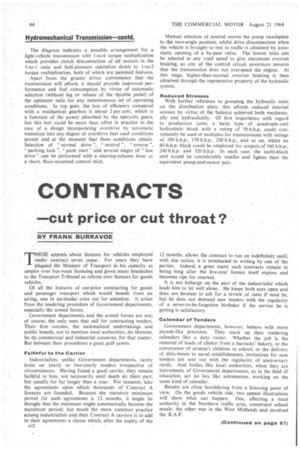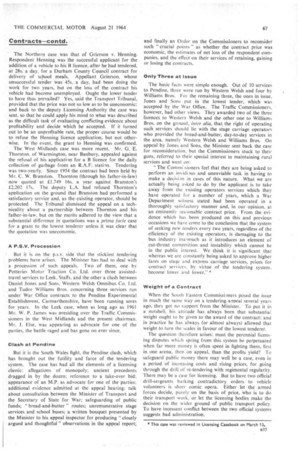CONTRACTS
Page 68

Page 69

Page 71

If you've noticed an error in this article please click here to report it so we can fix it.
cut price or cut throat?
BY FRANK BURRAVOE THESE appeals about licences for vehicles employed under contract never cease. For years they have plagued the Minister of Transport in his capacity as umpire over bus-route licensing and given many headaches to the Transport Tribunal as referee over licences for goods vehicles.
Of all the features of cut-price contracting for goods and passenger transport which would benefit from an airing, one in particular cries out for attention. It arises from the tendering procedure of Government departments, especially the armed forces.
Government departments and the armed forces are not, of course, the only ones that call for contracting tenders. Their first cousins, the nationalized undertakings and public boards, not to mention local authorities, do likewise. So do commercial and industrial concerns, for that matter. But between their procedures a great gulf yawns.
Faithful to the Carrier
Industrialists, unlike Government departments, rarely insist on yearly or two-yearly tenders irrespective of circumstances. Having found a good carrier, they remain faithful to him, not necessarily until death do diem part, but usually for far longer than a year. For instance, take the agreements upon which thousands of Contract A licences are founded. Because the statutory minimum period for such agreements is 12 months, it might be thought that the minimum might automatically become the maximum period; but much the more common practice among industrialists and their Contract A carriers is to add to their agreements a clause which, after the expiry of the B32 12 months, allows the contract to run on indefinitely until, with due notice, it is terminated in writing by one of the parties. Indeed, a great many such contracts remain in being long after the five-year licence itself expires and becomes ripe for renewal.
It is not lethargy on the part of the industrialist which leads him to let well alone. He keeps both eyes open and does not hesitate to ask for a review of rates if need be, but he does not demand new tenders with the regularity of a never-to-be-forgotten birthday if the service he is getting is satisfactory.
Calendar of Tenders
Government departments, however, behave with more parade-like precision. They mark up their tendering calendars like a duty roster. Whether the job is the removal of loads of clinker from a barracks' bakery, or the conveyance of airmen's children to school, or the delivery of ditty-boies to naval establishments, invitations for new tenders are sent out with the regularity of anniversary cards. And bodies like local authorities, when they are instruments of Government departments, as in the field Of education, act no less like automatons, working on the same kind of calendar.
Results are often bewildering from a licensing point of view. , On the goods vehicle side, two appeal illustrations will show what can happen. One, affecting a local authority in the Northern traffic area, concerned school meals; the other was in the West Midlands and involved the R.A.F.
7. Wood of Blyth is a sand merchant. collects sand from the sea shore, xesses it, purifies it and grades it fore selling throughout the North St. But first he has to cart it —loads 13 tons 16 cwt. within the Limit — ross an expanse of beach, sand dunes d rough-hewn tracks. Tough territory third axle six-wheelers — only a 3:ged, robust York Third Axle could ae so easily.
:re's why York Third Axles are tops tippers.
rat: only York has independant suspen m to eliminate traction loss and. looth out ride,
mod: York's adjustable load distribu
n means that increased traction is iickly and easily available. You imly use the alternative rocker arm les to switch from normal 55-45 ight distribution to 60-40 distribution th that extra weight transferred to driving axle. This suits Mr. Wood
fine. But, if the going is really rough, there's the York optional Air Load Transfer for ultimate traction. This temporarily transfers up to 4,500 lbs. of the payload from the third axle to the drive axle, giving you all the benefits of a double drive bogie at a fraction of the cost and weight.
Third: There's the safety of positive no-hop braking. For those hard, clock watching miles that Mr. Wood covers on delivery from the plant, the assurance of a safe no-hop stop is vital. Big rocker beams balance out brake torque automatically —keep tyres glued to the road.
York will build these benefits into your trucks. Write for details and prices of York Third Axle equipment and an operators' report, detailing the performance of Mr. Wood's six-wheelers, YORK TRAILER COMPANY LIMITED, CORBY, NORTHANTS. Telephone: Corby 3561. Telex: 34516. The Northern case was that of Grierson v. Henning. Respondent Henning was the successful applicant for the addition of a vehicle to his B licence, after he had tendered, at 28s. a day, for a Durham County Council contract for delivery of school meals. Appellant Grierson, whose unsuccessful tender was 45s. a day, had been doing the work for two years, but on the loss of the contract his vehicle had become unemployed. Ought the lower tender to have thus prevailed? Yes, said the Transport Tribunal, provided that the price was not so low as to be uneconomic; and back to the deputy Licensing Authority the case was sent, so that he could apply his mind to what was described as the difficult task of evaluating conflicting evidence about profitability and decide which he accepted. If it turned out to be an unprofitable rate, the proper course would be to refuse the Henning licence application, but not otherwise. In the event, the grant to Henning was confirmed.
The West Midlands case was more recent. Mr. G. E. Thornton. of Warmington, near Banbury, appealed against the refusal of his application for a B licence for the daily collection of garbage from an R.A.F. station. Tendering was two-yearly. Since 1954 the contract had been held by Mr, C. W. Branston. Thornton (through his father-in-law) now quoted at £1,749 16s. a year against Branston's £2,202 I7s, The deputy L.A. had refused Thornton's application on the ground that Branston had performed a satisfactory service and, as the existing operator, should be protected. The Tribunal dismissed the appeal on a technicality about a partnership between Thornton and his father-in-law, but on the merits adhered to the view that a substantial difference in quotations was a prima fade case for a grant to the lowest tenderer unless it was clear that the quotation was uneconomic.
A P.S.V. Procession
But it is on the p.s.v_ side that the stickiest tendering problems have arisen. The Minister has had to deal with a procession of such appeals. Two of them, one by Potteries Motor Traction Co. Ltd. over three assistedtravel services to Leek, Staffs, and the other a clash between Daniel Jones and Sons. Western Welsh Omnibus Co. Ltd. and Tudor Williams Bros. concerning three services run under War Office contracts to the Pendine Experimental Establishment, Carmarthenshire, have been running sores for years. in the Leek case, when as long ago as 1961 Mr. W. P. James was presiding over the Traffic Commissioners in the West Midlands and the present chairman, Mr. J. Else, was appearing as advocate for one of the parties, the battle raged and has gone on ever since.
Clash at Pendine
But it is the South Wales fight, the Pendine clash, which has brought out the futility and farce of the tendering system. The case has had all the elements of a licensing classic: allegations of monopoly; ancient precedents dragged in by the dozen; reference to a take-over bid; appearance of an M.P. as advocate for one of the parties; additional evidence admitted at the appeal hearing; talk about consultation between the Minister of Transport and the Secretary of State for War; safeguarding of public funds; " bread-and-butter" routes; unremunerative stage services and school buses; a written bouquet presented by the Minister to his appeal inspector for producing "closely argued and thoughtful" observations in the appeal report; and finally an Order on the Commissioners to reconsider such " crucial points" as whether the contract price was economic, the estimates of net loss of the respondent companies, and the effect on their services of retaining, gaining or losing the contracts.
Only Three at Issue
The basic facts were simple enough. Out of 10 services to Pendine, three were run by Western Welsh and four by Williams Bros. For the remaining three, the ones in issue, Jones and Sons put in the lowest tender, which was accepted by the War Office. The Traffic Commissioners, however, had other views. They awarded two of the three licences to Western Welsh and the other one to Williams Bros. on the ground, inter alia, that the right of operating such services should lie with the stage carriage operators who provided the bread-and-butter, day-to-day services in the area, namely Western Welsh and Williams Bros. On appeal by Jones and Sons, the Minister sent back the case for reconsideration, but the Commissioners stuck to their guns, referred to their special interest in maintaining rural services and went on: "The Commi:sioners feel that they are being asked to perform an insidious and unenviable task in having to make a decision in cases of this nature. What we are actually being asked to do by the applicant is to take away from the existing operators services which they have operated for a number of years, which a War Department witness stated had been operated in a thoroughly satisfactory manner and, in our opinion, at an eminently reasonable contract price. From the evidence which has been produced on this and previous occasions we have come to the conclusion that the system of seeking new tenders every two years, regardless of the efficiency of the existing operators, is damaging to the bus industry inaqriuch as it introduces an element of cut-throat competition and instability which cannot be in the public interest. We think it is significant that whereas we are constantly being asked to approve higher fares on stage and express carriage services, prices for contract services, by virtue of the tendering system. become lower and lower." *
Weight of a Contract
When the South Eastern Commissioners posed the issue in much the same way on a tendering aopeal several years ago, they got no support from the Minister. To put it in a nutshell, his attitude has always been that substantial weight ought to be given to the award of the contract; and in practice he has always (or almost always) allowed that weight to turn the scales in favour of the lowest tenderer.
The question therefore arises: must the perennial licensing disputes which spring from this system be perpetuated when far more money is often spent in fighting them, first in one arena, then on appeal, than the profits yield? To safeguard public money there may well be a case, even in a period of increasing costs and rising prices, for going through the drill of re-tendering with regimental regularity. There may be a case for licensing. But to have two official drill-sergeants barking contradictory orders to vehicle volunteers is sheer comic opera. Either let the armed forces decide, purely on the basis of price, who is to do their transport work, or let the licensing bodies make the decision on the wider ground of public transport policy. To have incessant conflict between the two official systems suggests bad administration.






















































































































